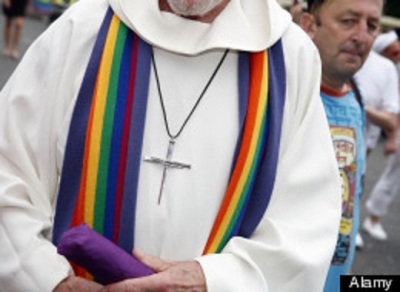More than 70 Catholic priests and deacons gathered at a London church yesterday to pray, share concerns, and discuss the future of the Church.

Priests’ meeting at St John’s, Waterloo
The meeting at St John’s Anglican Church, Waterloo, was called following a letter in the Tablet (2 June 2012) by seven priests, speaking of the ‘universal call to holiness in Christ’ for all the baptised made by the bishops at their November 2011 conference, and their desire to promote ‘a culture of vocation’ within the corporate identity of the Catholic Church, ‘marked by a confident Catholic faith’. The authors called for a more active encouragement of lay people in the work of the Church, and expressed concern that the call for collegiality made by Vatican II has not been realised.
After an opening prayer, the assembly sang Veni Sancte Spiritus and there was a short period of silence.
Fr Joe Ryan, north London parish priest and chair of Westminster Justice and Peace said he was glad to be part of the process of “building up the body of Christ” by attending the meeting. Fr Paul Saunders from Southwark Diocese said he saw it was “part of our stewardship” to pass on and develop the teachings of Vatican II.
Fr Patrick McLaughlin who spent years in peace and reconciliation at Corrymeela in Northern Ireland quoted Antony Di Mello who spoke of the need to “combine loyalty and obedience with creativity and confrontation”. At Corrymeela, he said, they had endeavoured to work collaboratively with people from different communities – “opening up spaces where people could be listened to with respect and gentleness”. The result, he pointed out, was that Ian Paisley and Martin McGuinness eventually came to work together.
In a brief presentation, theologian Mary Gray spoke of her overwhelming sense of priests with a deep love of the Church but with great concerns for the future, with an ageing priesthood, declining vocations and loss of young people. There had a been euphoria after Vatican II, she said, but this had been followed by a great sense of disappointment.
“We could not have expected the failure to implement the teachings of Vatican II and the backlash that has followed”, she said. “People are confused. They see married former Anglican priests with families being ordained but Catholic seminarians cannot marry and there is no discussion about this.”
Underlying all this, she said, was the fact that people are afraid to speak, or be seen as critical in any way, for fear of very serious censure.
She advised: “As St Ignatius said: ‘go where the energy is good’. And that is – the monasteries, convents, and organisations like CAFOD”. She also advised people to express their views. Quoting Catherine of Siena she said: ‘I see that the world is destroyed through silence.’
-more at Independent Catholic News










